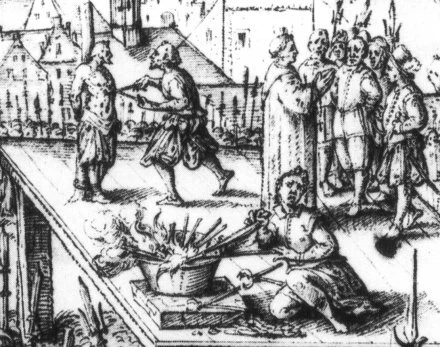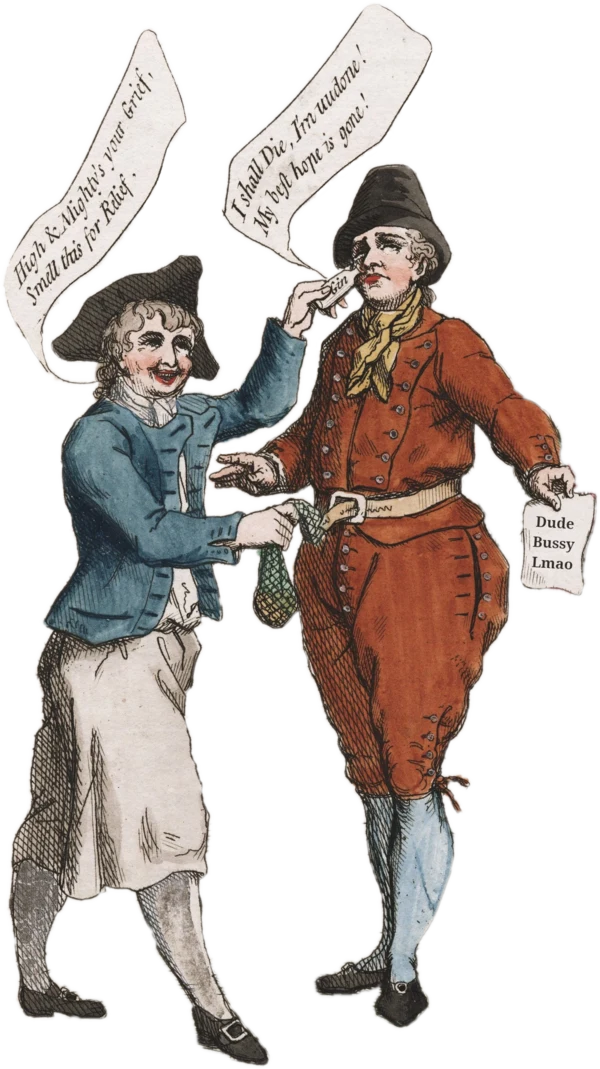 It's the GRAND finale of the Munster Saga!
It's the GRAND finale of the Munster Saga!  Aren't you excited? Relieved? I can tell you needed your Munster fix; you've been tweaking for days now and it's really noticeable. Anyway, last time(s) LINK | LINK I covered how Munster coped with Jan Matthias' death, the Bishop's failed attempts at retaking the city before deciding to just starve it out, how a little bit of coomerism almost made everything unravel, and van Leyden's royal LARP. Now we'll see if the Bishop can actually manage a win for once and if van Leyden can establish that Kingdom-of-God-on-Earth-thing
Aren't you excited? Relieved? I can tell you needed your Munster fix; you've been tweaking for days now and it's really noticeable. Anyway, last time(s) LINK | LINK I covered how Munster coped with Jan Matthias' death, the Bishop's failed attempts at retaking the city before deciding to just starve it out, how a little bit of coomerism almost made everything unravel, and van Leyden's royal LARP. Now we'll see if the Bishop can actually manage a win for once and if van Leyden can establish that Kingdom-of-God-on-Earth-thing
===================
RIDER ON A BLACK HORSE
===================
Fall turned into Winter and no help came for Munster. As it had turned out, none of the 27 Apostles succeeded in their task. The news had only reached Munster by way of the return of Henry Graes, the only Apostle to survive the failed mission. Graes was awarded a short tenure in the King's court, as his escape was considered miraculous, but he was soon given another mission. Graes was sent out the city at the beginning of the new year, 1535. He was expected to accomplish what the other apostles could not: garner support from surrounding towns for Munster.
To the credit of the Munsterites, it wasn't completely delusional to expect some kind of relief force to appear and save the day. Anabaptism was still garnering more support every day, particularly in the Netherlands and North Western Germany, areas close to Munster.
In fact, party of a couple thousand of them was busted some months before by local authorities in the Netherlands. They were transporting a stockpile of weapons and were bound for Munster. Another of these war parties was rumored to be organizing in Wesel, a town near Munster generally sympathetic to their cause. Henry Graes, still on his mission outside Munster, sent two of his men to assess the group and assist them in whichever way they could.
(Van Leyden Judging one of his wives who had given up on the cause before ordering her execution)
In less optimistic news, people still need to eat. King Jan had been tightening the belt on rations, but that could only last so long. Eventually, starvation began to set in. Well, not for him, of course. Van Leyden and his court still ate lavish meals, and the garrison was given enough to sustain itself. It was mostly the civilian population that suffered the food shortage. For a time, this was remedied by allowing some of the population to flee the city. The old and young went first, but it wasn't long until many fit adults were requesting permission to leave. No one was forced out the city, but Anabaptist leaders made it clear to the population that some of them had to go.
Those that did go hardly fared better outside the walls. The Bishop was in no mood to be forgiving to those he saw as traitors. He ordered his men to execute any adult male refugee on sight, and to refuse shelter and food to the women and children. Count Falkenstein protested the order, but while he held operational control over the army, he had no influence over the citizens subject to the Bishop. Most refugees that weren't executed remained stranded in the no man's land between the city and encircling army. Those that survived only did so by the charity of the soldiers. Begging on the outskirts of army encampments became their only source of food and water.
=================
FRAUD AND DECEPTION
=================
Mein König... Graes...
Is a turncoat. Turns out he only survived by offering to spy for the Bishop, rather than having been saved by divine intervention. His handling of the situation was actually pretty clever. He hit the Bishop where it hurt most: the ego. Franz happened to have visited his group of prisoners before they were all executed, during which Graes said something along the lines of:
“Does the Bishop have no power to set a prisoner free?”
It's a dig at the Bishop's thoroughly embarrassed authority. That, and the fact that it was said in Latin (a language that of those present, only the Bishop and Graes would know), caught Von Waldeck's attention. He pulled Graes aside for a private meeting, during which Graes agreed to return to Munster as spy. The agreement didn't let Graes off the hook fully, but it meant that he wouldn't be executed.
Oh yeah, and those two agents he sent to "assist" the militia in Wesel? They immediately ratted them out to the authorities when they arrived. No Steiner's attack was coming to deliver the final victory. The Anabaptists didn't even know of Graes' defection until he sent them a letter on May 28th, gloating about it and telling them they're all "poor, stupid people [who] can't recognize that in its entirety what you're engaged in is fraud and deception." Direct quote from the letter 
Disillusioned schoolteachers weren't the only ones jumping ship into the Bishop's arms. Remember Henry Gresbeck? He was the one at the wedding that witnessed Jan Matthias' final vision. He'd been serving as a guardsman at the walls for a while, but only now saw the writing on them. Munster was withering under the Bishop's blockade and he wasn't aiming to go down with it. Gresbeck crafted a plan to escape, using his knowledge of the entrances and exits of the city to go unnoticed by the guards on post. Accompanied by a small group of others, including one John "Little Hans" of Longstreet, so-called because of his diminutive height, he escaped the city under cover of night.
The only reason he wasn't immediately killed was because of his young age. Then, the only reason he was allowed to keep living was his usefulness to the Bishop's cause. Gresbeck, in exchange for his life, offered Count Falkenstein his knowledge of the city (yes, the two traitors were both named Henry). The gap in the walls that he and Little Hans used to escape made the perfect secret entrance for a surprise assault. Falkenstein even made him design a full diorama of the city layout as he remembered it (Gresbeck was an experienced carpenter), just to gather as much information about the city as he could before trying anything.
Count Falkenstein only told Gresbeck what his fate would be after he'd given up all the information he could. He'd live, even be granted his freedom, but only after accompanying the army in the assault on the city. Gresbeck was to follow the army across the moat to the gap in the walls, but stop there. While the Bishop's army was securing the city, killing any of the garrison they could, he was to stay put. If he attempted to leave, he'd be treated as a fleeing enemy and cut down. He was also told that the only reason his story was believed was because Little Hans of Longstreet had corroborated it. Little Hans had connections to one of the noble officers in the army, so he'd been allowed to live as well.
==================
RIDER ON A PALE HORSE
==================
Falkenstein planned to conduct the attack much in the same way Gresbeck had made his escape. Using Gresbeck's knowledge of the guard's activities and the cover of night, a contingent of a few hundred soldiers was to make their way into the gap, take control of the garrison there, and establish a foothold within the city on the 22nd of June. Count von Falkenstein would wait outside the city with the rest of the army, commencing his own attack once news of their success reached him.
From there, they'd mop up the remainder of Anabaptist resistance, capture their leaders, and allow the soldiers to loot as they pleased (as per their contract). A final offer to surrender was rejected by King Jan on June 8th, who reportedly laughed while saying "Ask me in a year." 
Initial steps went on without a hitch: they'd crossed the moat and entered the walls unnoticed, managing to slaughter an entire guardhouse in their sleep. Pushing on to the city proper, the alarm finally sounded, signaling they'd been discovered. Fighting began proper after that, but the Bishop's soldiers soon found themselves encircled. Turns out they'd forgotten to leave a garrison at the walls, and the Anabaptists had retaken it without a fight.  Falkenstein was still holding off on attacking as he received no communications from inside the city.
Falkenstein was still holding off on attacking as he received no communications from inside the city.
Malnourished and demoralized, the Anabaptist soldiers were feeling the effects of the food shortage, and were unable to finish off the encircled troops before daybreak. When light finally made the city visible, the army inside signaled for reinforcements. Falkenstein finally had enough confidence to attack, and the fight from there was a cakewalk. The Bishop's army had dwindled to around 3,000 men by this time, but still outnumbered the defenders by double.
(Von Waldeck judging Knipperdolling, Kretching, and Van Leyden) (Current events used to get a lot of cool art done about them, why does no one do that anymore???)
Once the remaining army was inside the city, the fighting turned into a route. This had turned into an exhausting affair for the Anabaptists. Most had known Munster was lost for some time now, and those that remained only did so because they had no other choice. They had no interest in laying down their lives for a doomed king or cause already dead.
All there was left to protect were their own lives, so most civilians attempted to flee while the soldiers fought. The mercenaries had been instructed to give no quarter, nor did they want to. They killed indiscriminately, soldier and civilian, looting whatever was left. Most of what was left was worthless, as anything valuable had long been seized and pawned off by Anabaptist leadership to buy more time.
The Leaders suffered various fates. Henry Kretching had taken lead of a small company of troops and found a defensible position, so he was allowed to leave the city unharmed so long as he took his men with him. Bernard Kretching was captured while fighting. Herman Tilbeck was stabbed to death while hiding in an outhouse. Knipperdolling fought hard the entire battle, but ended up captured days later, found hiding in an attic. Rothmann was seen fighting early on, but disappeared sometime into the battle. His body was never discovered, and rumors that he escaped circulated afterward. King Jan was seized and given into custody at a gate leading out the city. Some say he was fighting there, others that he was attempting to escape.
=============
LAST JUDGEMENT
=============
The Anabaptist dream...  Munster has fallen
Munster has fallen  and any remnants of active resistance were pushed North into the countryside, acting more as marauders and bandits than religious revolutionaries. Anabaptism continued to spread but it was mostly the peaceful sects drawing in new members. Aside from a short-lived attempt by 2 disgruntled noblemen to establish another holy city in the Netherlands, Melanchior's dream of a holy kingdom on Earth was dead.
and any remnants of active resistance were pushed North into the countryside, acting more as marauders and bandits than religious revolutionaries. Anabaptism continued to spread but it was mostly the peaceful sects drawing in new members. Aside from a short-lived attempt by 2 disgruntled noblemen to establish another holy city in the Netherlands, Melanchior's dream of a holy kingdom on Earth was dead.
As for the captured leaders, they stuck around for some time. Jan van Leyden met with the Bishop's chaplain for questioning and theological debate during his imprisonment, confessing that he'd gone too far with the Munster business, but never denouncing Anabaptism itself. Knipperdolling was completely unapologetic. Their executions were foregone conclusions by this point, scheduled for the 22nd of January. There's nothing they could have said or done that'd make any difference.
The plaza before St. Lambert's hosted the ceremony. The Bishop himself was in attendance, as well as a few church officials that'd later go on to chronicle the event. Van Leyden, Knipperdolling, and Kretching were all stood atop a wooden platform, held in place by metal collars adorned with spikes pointed inward. Their bodies were to be ripped apart with heated irons while they still lived. Von Waldeck took care that every chunk of flesh removed from the condemned was felt, smelling salts prepared should any of them faint from the pain. Knipperdolling attempted to kill himself on the spiked collar, but was revived. He and Kretching wailed as their flesh was mangled, while van Leyden remained relatively stoic. Each had to endure an hour of torture before they were allowed to die.
Their decaying, mutilated bodies were hung in cages on the cathedral spire, a message to anyone doubting the Bishop's authority.
(They're even still there)
Treatment of Anabaptist women was comparatively tame. Every woman captured during the assault was given the choice to denounce Anabaptism, or face execution. Some, particularly noblewomen, were allowed to be ransomed to their families without denouncing their faith. Divara was executed.
Franz's later reign and legacy were forever marred by Munster. He was left hopelessly in debt, so much so that the Bishop of Munster was still paying off loans to the Bishop of Cologne by 1617, years after Von Waldeck's death. In an effort to cut on costs, he attempted to dock the mercenaries' pay. The measure was walked back after threats of riots surfaced, but he managed to find and keep for himself a couple barrels of gold stored under Van Leyden's palace (a violation of the looting clause of his contract).
The Bishop's especially heavy handed approach to the siege and its aftermath won him a reputation for cruelty. Franz von Waldeck is remembered by history as the perfect caricature of the greedy, wrathful noble lord, an embodiment of the unjust system many Anabaptists and their admirers saw themselves as fighting against.
But hey, someone made a LEGO tribute to him, for some reason
All-in-all Anabaptism didn't have a super profound impact on the state of Europe or the reformation. A lot of people hold it as being significant thanks to its anti-feudal and antigovernmental slants but it was more symptom of the general dissatisfaction of the time, rather than any catalyst for future change or something that would effect Europe long term.
As for what happened to the more general Anabaptist movement, they all became Mennonites and Amish. Those are the only two major sects alive today (Baptism is not an Anabaptist sect btw; it shares a similar theological foundation, but originates separately in England and never quite had the same militant leanings).
And if you wanted to know the fate of our more minor characters: Henry Gresbeck was fine (though did not have his property returned to him) and lived the rest of his life as a normal craftsman (but he did write an account of his time in Munster), Little Hans was awarded a house in Munster, but was murdered a few years later after he tried to scam a jewelry maker out of a payment, Bernard Kretching lead small groups of Anabaptist guerillas in North Germany until he died in 1580, and Henry Graes returned to teaching in a town not too far from Munster.
This def could've been more detailed, but it's hard to keep up enthusiasm when writing for this long. I'll be making a post on /h/lit cuz I want to be transparent about sources since I am a SCHOLAR of INTEGRITY and HONESTY raising the BLIND LAITY reaching from the TANTALIAN PIT of IGNORANCE into the CLEAR DAY of TRUE KNOWING






 [Commie Waco Finale]
[Commie Waco Finale]








Jump in the discussion.
No email address required.
tldr
Jump in the discussion.
No email address required.
Gotta make sure your subjects know their place somehow
Jump in the discussion.
No email address required.
another tldr please I dind't read this shit at all
Jump in the discussion.
No email address required.
Jump in the discussion.
No email address required.
holy shit!!!!!!!!!!
Jump in the discussion.
No email address required.
More options
Context
More options
Context
More options
Context
More options
Context
Germans are not human beings.
Jump in the discussion.
No email address required.
Jump in the discussion.
No email address required.
More options
Context
More options
Context
A handful of Protestant-Protestants took over a city, kicked out the Catholics, almost kicked out the Lutherans, went to battle against the ruling Price Bishop and several surrounding armies. The city was put under a long seige and starved out. A small commando group of soldiers got into the city and was able to take it back from the inside. The surviving instigators were executed by having pieces of their body torn away with hot tongs and molten stuff poured into the wounds, and eventually town to shreds. Their skeletons were put in cages and hung from the city walls.
The longer story includes walkie-talkie revelations from God, mandatory polygamy, wife swapping, and old men marrying 11 year old girls.
It's basically the same story as Joseph Smith and Brigham Young and the Mormons.
Jump in the discussion.
No email address required.
tldr
Jump in the discussion.
No email address required.
they no like vegetals
Jump in the discussion.
No email address required.
More options
Context
More options
Context
More options
Context
More options
Context
Also I couldn't find anywhere to include this, but Gresbeck came away from Munster pretty racist against Dutch people, saying this in his account of the disaster:
So if you gleam nothing else from this, at least leave with the foresight to never listen to a Dutchman
Jump in the discussion.
No email address required.
Hearing them speak two sentences of dutch is enough to learn that lesson tbh
Jump in the discussion.
No email address required.
More options
Context
Jump in the discussion.
No email address required.
More options
Context
More options
Context
Great write up, do more pls
Jump in the discussion.
No email address required.
More options
Context
Münster ist gefallen… das Himmelreich ist vorbei
VGH Mormon schizos in swamp Germany… what could have been
Jump in the discussion.
No email address required.
Pretty much an identical story, underage polygamy and fighting the government and everything else.
Jump in the discussion.
No email address required.
More options
Context
More options
Context
great series, thank you!
Jump in the discussion.
No email address required.
More options
Context
Snapshots:
Where I found this:
ghostarchive.org
archive.org
archive.ph (click to archive)
Jump in the discussion.
No email address required.
Ooooo topical
Jump in the discussion.
No email address required.
More options
Context
More options
Context
Jump in the discussion.
No email address required.
More options
Context
Jump in the discussion.
No email address required.
More options
Context
Two riders were approaching and the wind began to howl
Jump in the discussion.
No email address required.
More options
Context
This is a great Hardcore History episode
Jump in the discussion.
No email address required.
More options
Context